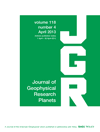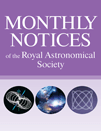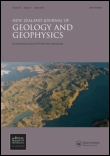
JOURNAL OF GEOPHYSICAL RESEARCH-PLANETS
metrics 2024
Connecting Scholars to the Universe's Wonders
Introduction
The JOURNAL OF GEOPHYSICAL RESEARCH-PLANETS, published by the American Geophysical Union, stands at the forefront of planetary science research, serving as an essential resource for scholars and practitioners exploring the complexities of planetary bodies within our solar system and beyond. With its ISSN 2169-9097 and E-ISSN 2169-9100, this respected journal has demonstrated a notable impact within the academic community, holding a prestigious Q1 ranking in multiple categories including Earth and Planetary Sciences, Geochemistry and Petrology, Geophysics, and Space and Planetary Science as of 2023. Its Scopus rankings further highlight its significance, placing it among the top echelons of Earth and planetary sciences—particularly as it ranks 12th in its broad category. While not an open access platform, the journal provides invaluable insights into planetary processes, geological phenomena, and the ongoing exploration of celestial environments, making it indispensable for researchers, professionals, and students dedicated to advancing our understanding of planetary systems. Established in 1996 and continuing to publish until 2024, the journal remains committed to fostering innovation and collaboration in this dynamic field of study.
Metrics 2024
 1.65
1.65 3.90
3.90 4.20
4.20 169
169Metrics History
Rank 2024
Scopus
IF (Web Of Science)
JCI (Web Of Science)
Quartile History
Similar Journals

Geofizika
Illuminating the Path of Earth Science ResearchGeofizika, an esteemed journal published by the Andrija Mohorovičić Geophysical Institute at the University of Zagreb, presents a significant platform for research in the fields of geophysics and Earth sciences. With an Open Access model established since 1984, this journal ensures that scientific knowledge is accessible to a broad audience, encouraging collaborations and the free exchange of ideas. Geofizika has steadily evolved through its converging years from 1989 to 1999 and has been active from 2003 to the present, reflecting its commitment to advancing geophysical research. The journal has been recognized for its contributions to Earth and Planetary Sciences and has acquired respectable ranks in various categories; notably, it holds a Q4 status in Geophysics as of 2023. Researchers, professionals, and students will find Geofizika a valuable resource for the latest discoveries and methodologies in geophysics, supporting the academic community in expanding the frontiers of knowledge in these vital scientific domains.

Journal of the Korean Earth Science Society
Connecting Scholars in Earth Science ExcellenceJournal of the Korean Earth Science Society is a leading peer-reviewed publication dedicated to advancing research in the dynamic field of Earth sciences. Published by the Korean Earth Science Society, this journal serves as a vital platform for disseminating original research, reviews, and significant advancements in areas such as geology, mineralogy, geophysics, and environmental science. With its ISSN 1225-6692 and E-ISSN 2287-4518, the journal is recognized for its commitment to quality and rigor. Although it does not provide open access options at present, it continues to play a crucial role in informing the scholarly community and enhancing the understanding of Earth science phenomena, thus bridging knowledge gaps and fostering collaboration among researchers, professionals, and students alike. For those interested in the latest developments and innovative research findings in Earth sciences, the Journal of the Korean Earth Science Society remains an indispensable resource.

Earth and Space Science
Connecting Research with Global Environmental Solutions.Earth and Space Science, published by the American Geophysical Union, is a distinguished open-access journal that has profoundly impacted the realms of earth and planetary sciences as well as environmental science since its inception in 2014. With impressive rankings, including Q1 in both Earth and Planetary Sciences and Environmental Science for 2023, this journal ranks 38th out of 195 in the general Earth and planetary sciences category and 51st out of 219 in environmental science, showcasing its commitment to high-quality research dissemination. The journal serves as a vital platform for researchers, professionals, and students, fostering the exploration of critical topics and advancements within these pivotal fields. With an accessible format, researchers can benefit from the rich content available, furthering their knowledge and ensuring that groundbreaking discoveries reach a broader audience. The journal's ongoing commitment to open access aligns with contemporary trends in scholarly communication, emphasizing inclusion and collaboration in tackling pressing global challenges.

EARTH MOON AND PLANETS
Connecting Worlds: Interdisciplinary Research on Earth, Moon, and PlanetsEARTH MOON AND PLANETS, published by Springer, serves as a vital platform for researchers and professionals in the interdisciplinary fields of astronomy, planetary science, and earth sciences. With an ISSN of 0167-9295 and E-ISSN of 1573-0794, this journal has been disseminating knowledge since 1984 and continues to provide valuable insights into the complexities of celestial bodies and their interactions. Although currently ranked in the Q4 quartile across its relevant categories, including Astronomy and Astrophysics, Earth and Planetary Sciences, and Space and Planetary Science, the journal remains committed to fostering academic discourse and innovation in its field. Located in the Netherlands, at VAN GODEWIJCKSTRAAT 30, 3311 GZ DORDRECHT, the journal offers an array of research articles designed to inspire scholarly exploration and collaboration. Despite not providing open access options, it nevertheless plays a significant role in shaping the discourse around planetary research and is essential reading for anyone looking to deepen their understanding of earth, moon, and planetary sciences.

MONTHLY NOTICES OF THE ROYAL ASTRONOMICAL SOCIETY
Advancing Knowledge in Astronomy and Beyond.The MONTHLY NOTICES OF THE ROYAL ASTRONOMICAL SOCIETY (MNRAS), published by Oxford University Press, serves as a premier platform for the dissemination of significant research in the fields of Astronomy, Astrophysics, and Space and Planetary Science. Established in 1913 and with an impressive impact factor reflected in its 2023 Q1 rankings—13th in Earth and Planetary Sciences and 14th in Physics and Astronomy—this journal is renowned for its rigorous peer-reviewed articles, fostering advancements in our understanding of the universe. Researchers, professionals, and students alike benefit from its rich content, which spans a vast array of topics within its scope, from stellar dynamics to planetary formation. While the journal does not currently offer Open Access options, the scholarly contributions published herein are invaluable for pushing the boundaries of contemporary scientific inquiry and ensuring that the latest findings reach an engaged audience globally.

INTERNATIONAL JOURNAL OF EARTH SCIENCES
Exploring the Depths of Earth and BeyondINTERNATIONAL JOURNAL OF EARTH SCIENCES, published by Springer, is a leading journal in the field of Earth and Planetary Sciences, distinguished by its Q1 quartile ranking in the 2023 category of Earth and Planetary Sciences (miscellaneous). With an ISSN of 1437-3254 and an E-ISSN of 1437-3262, this journal has been a pivotal platform for researchers, academics, and practitioners since its inception in 1996. The journal's focus encompasses a broad range of topics within Earth sciences, making it a vital resource for contributions that enhance our understanding of geological processes, climate change, and planetary dynamics. The impact factor reflects its high standards and the significance of the research it publishes, ranking it in the 74th percentile among its peers as per Scopus. Furthermore, the journal offers Open Access options, facilitating the global dissemination of groundbreaking research. The editorial team is committed to advancing knowledge in Earth sciences, serving as an essential reference for students and professionals looking to engage deeply with this dynamic field.

NEW ZEALAND JOURNAL OF GEOLOGY AND GEOPHYSICS
Connecting Scholars Through Groundbreaking Geological Insights.NEW ZEALAND JOURNAL OF GEOLOGY AND GEOPHYSICS, published by Taylor & Francis Ltd, stands as a prominent forum dedicated to the interdisciplinary exploration of geological and geophysical phenomena. With an impact factor that situates this journal in the prestigious Q1 category across key subjects—namely Earth and Planetary Sciences, Geology, and Geophysics—it is a critical resource for researchers, professionals, and students alike. The journal has been operational since 1958 and continues to contribute valuable insights into the complexities of the Earth's processes. Although it does not currently offer Open Access options, its broad readership benefits from an extensive archive of high-quality research findings that span from 1958 to 2024. Located in the United Kingdom, the journal remains a pivotal player in advancing the understanding of Earth's systems, making significant contributions to both academic inquiry and practical applications in the field.

SPACE SCIENCE REVIEWS
Unraveling the Mysteries of Space ScienceSPACE SCIENCE REVIEWS, published by Springer, is a premier interdisciplinary journal that has been at the forefront of space science research since its inception in 1962. With an impressive impact factor and a distinguished Q1 ranking in both Astronomy and Astrophysics, as well as Space and Planetary Science, it stands as a leading platform for the dissemination of cutting-edge research. The journal encompasses comprehensive reviews covering a diverse array of topics, from cosmic phenomena to planetary exploration, serving as a critical resource for researchers, professionals, and students alike. Although it operates primarily under a subscription model, its commitment to excellence and rigorous peer-review process ensures that each article meets the highest standards of scientific integrity. With its headquarters in the Netherlands, SPACE SCIENCE REVIEWS is positioned strategically to foster global collaboration in the field, making it an invaluable asset for anyone interested in the ever-evolving landscape of space science.

SOLAR SYSTEM RESEARCH
Advancing Knowledge in Astronomy and BeyondSOLAR SYSTEM RESEARCH, published by Pleides Publishing Inc, offers a comprehensive platform for the exploration and dissemination of scientific knowledge in the fields of Astronomy, Astrophysics, and Space and Planetary Science. With its origins tracing back to 1969, this journal provides a vital resource for researchers and professionals seeking to deepen their understanding of the solar system's complexities, including planetary formation, extraterrestrial geology, and the dynamics of celestial bodies. Although categorized in the Q4 quartile for both relevant disciplines, SOLAR SYSTEM RESEARCH remains committed to publishing high-quality research that contributes to advancing contemporary scientific discourse. Dedicated to fostering collaboration and innovation, the journal is indexed in Scopus and adheres to rigorous academic standards, making it an essential resource for students and professionals alike pursuing the latest developments in solar system studies.

GEOLOGICAL QUARTERLY
Exploring Earth's Mysteries, One Quarter at a Time.GEOLOGICAL QUARTERLY, published by the Polish Geological Institute, is a respected journal in the field of geology, offering insights into Earth and planetary sciences since its inception in 2000. With an ISSN of 1641-7291 and an E-ISSN of 2082-5099, this journal serves as a vital platform for researchers, professionals, and students seeking to expand their knowledge in geological disciplines. The journal is positioned in Q3 within the geology category as of 2023 and ranks #172 out of 321 in Scopus, placing it in the 46th percentile among its peers. Although currently not an open-access publication, GEOLOGICAL QUARTERLY reflects the policy of fostering scientific communication and collaboration by disseminating valuable geological research. Its commitment to publishing original articles, reviews, and technical notes ensures that it plays a significant role in advancing geological science and its applications within the academic community. With its base in Warsaw, Poland, the journal stands as an important resource for anyone engaged in or studying the Earth sciences.